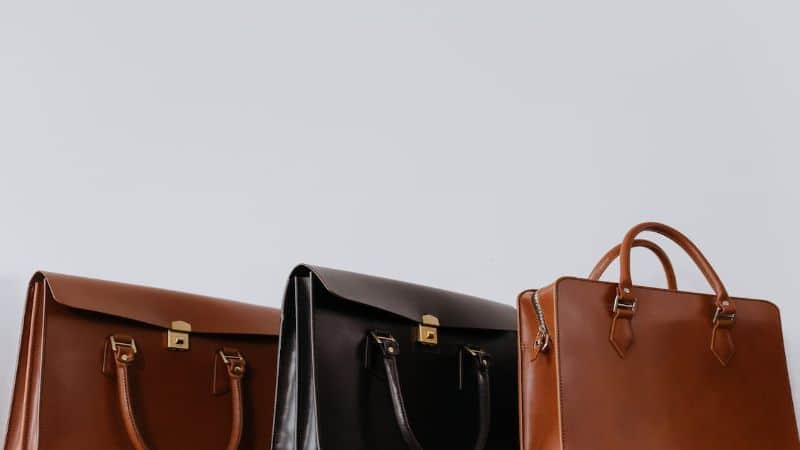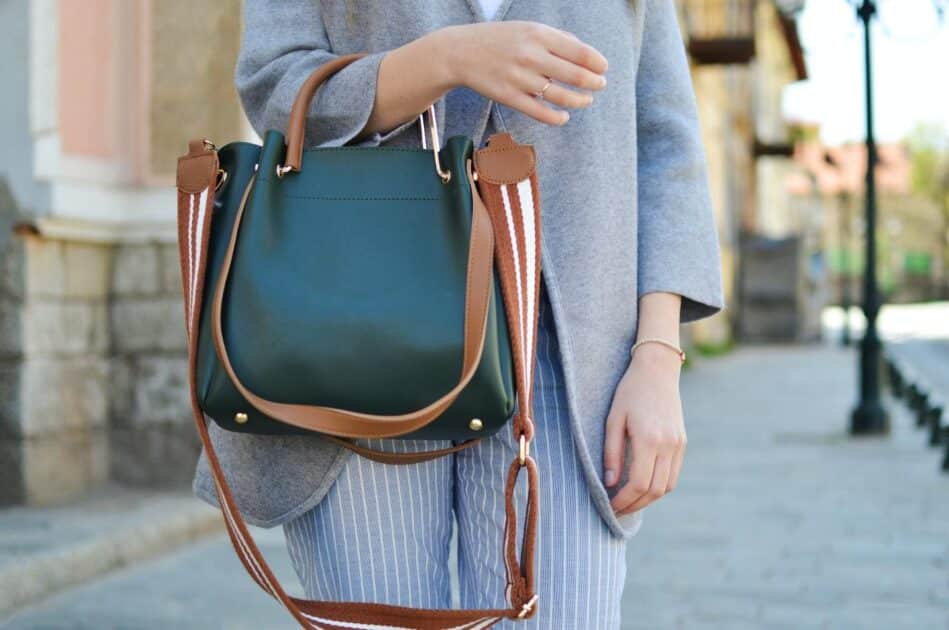You’ve probably noticed that a handbag is more than just a fashion statement—it’s an everyday essential. But have you ever stopped to weigh the pros and cons of carrying one? Whether it’s a chic clutch or a roomy tote, each style comes with its own set of advantages and disadvantages.

On one hand, handbags can be lifesavers, keeping your belongings organized and at your fingertips. But on the flip side, they can turn into a black hole of items you don’t really need. Plus, lugging around a heavy bag might be doing a number on your shoulder without you even realizing it.
Advantages of Handbags
Having established the importance of handbags for organization and accessibility, let’s delve into the myriad of benefits they offer. At their core, handbags aren’t just about toting around your essentials—they’re a marriage of function and style.
Style Statement
A handbag is much more than a carrying pouch. It’s a fashion statement—the perfect accessory that has the power to elevate your everyday look. Whether you’re going for a professional, casual or a more elegant ensemble, the right handbag can tie your outfit together. Plus, with a vast array of designs, you’re sure to find one that echoes your personal style.
Efficiency
When you’re on the move, efficiency is key. Handbags allow you to have all your essentials—phone, wallet, keys—at your fingertips. No more rummaging through coat pockets or desk drawers. Everything is neatly stowed in a place that’s easy to access.
Versatility
- Clutches for evenings out.
- Totes for work or shopping.
- Shoulder bags for everyday use.
- Backpacks for hands-free convenience.
Each type serves a different purpose and scenario, making handbags incredibly versatile. Swap them out according to the day’s needs.
Security
Handbags come with various features like zippers, clasps, and pockets, which help keep your belongings safe. Whether you’re commuting or traveling, you’ll appreciate the added security layered into the design of modern handbags.
Organization
Organizational enthusiasts rejoice—handbags come with compartments designed to keep your items orderly. With specific spots for everything, you won’t waste time searching. It’s efficiency at its best.
Remember, while handbags offer these benefits and more, finding the right balance between utility and fashion is key. Opting for quality and functionality will serve you well in the long run.
Disadvantages of Handbags
While handbags offer numerous benefits, they also come with certain drawbacks. As a handbag aficionado and industry expert, you’re aware that oversized bags can lead to shoulder and neck discomfort. Due to their capacity, it’s tempting to fill them to the brim, causing strain on your body. This can lead to long-term health issues like poor posture and muscle pain.
Another downside is the security risks associated with handbags. Large totes or satchels are particularly vulnerable to theft. When your bag is hanging loosely off your shoulder or sitting in a shopping cart, it becomes an easy target for pickpockets.
The cost of high-quality handbags can be prohibitive. If you’re someone who values designer labels and craftsmanship, you’re looking at a significant investment. This doesn’t always align with budget-conscious shopping, especially if you’re drawn to luxury brands.
Handbags can also be difficult to organize. Despite their intention to keep things in order, finding a specific item in a hurry often becomes a frustrating endeavor. Smaller items tend to get lost in the abyss of larger compartments, making it a hassle to locate them quickly.
Lastly, the fashion-first approach can sometimes overlook practicality. Some handbags, particularly those with unique designs or shapes, lack functionality. They might not fit all your essentials or be suitable for every occasion, limiting their use.
It’s clear that despite the allure and undeniable benefits of handbags, they’re not without their flaws. Bearing these in mind, it’s essential to weigh both sides when considering your next handbag purchase.
Organization and Accessibility
When it comes to keeping everyday items in check, handbags are lifesavers. Imagine trying to juggle your phone, keys, and wallet all at once—without a handbag, you’re bound to drop something.
Compartments are the holy grail for organization within a handbag. They allow you to allocate a spot for each item, making sure that your essentials are easy to find. No more frantic searching for your keys in an abyss of other items. You’ll find that some handbags even have dedicated pockets for tech items like tablets and laptops, ensuring that your gadgets are secure and accessible.
But it’s not just about practical storage. Think about those times you need to grab your lip balm or hand sanitizer quickly. A well-designed bag offers intuitive placement so that the most frequently used items are at your fingertips.
« Handbag Pros and Cons: Unveiling the Clutch Bag Dilemma
Handbag Disadvantages: The Surprising Health Risks You Need to Know »
However, over-reliance on multiple pockets can backfire. You might end up forgetting which compartment holds what, leading to mini scavenger hunts. Also, if a bag has too many pockets, it can become just as disorganized as one with none. It’s a balance you’ll need to find based on your carrying habits.
Adverse to digging through pockets? Consider a bag with a simpler layout. Sometimes a single spacious compartment with minimal pockets is all you need—and it encourages you to carry only the essentials.
For quick access, closure types matter. Zippers offer security; magnetic snaps and open tops make for easy entry. Each has its place, depending on whether your priority is keeping your belongings safe or grabbing them on the go.
Remember, the right handbag should resonate with your lifestyle. It’s about finding the ideal mix of pockets, size, and access that aligns with your daily rhythm.
Accidental Overpacking
You’ve embraced the practicality of handbags, yet there’s a hidden snare—accidental overpacking. It’s the pitfall where your bag’s benefits double as a downside. Consider this: the more pockets and space you have, the more tempted you are to fill them up. Initially, it seems logical to pack for those “just in case” scenarios—extra tissues, a spare charger, that book you’ve been meaning to read. But before you know it, your handbag turns into a portable junk drawer.
Imagine the strain on your shoulders and back from the extra weight. It’s not just physical discomfort; digging through an overpacked bag is a hassle. That quick access once promised by those numerous pockets is lost when you overload them. Remember, every item adds weight. Those extras add up, transforming convenience into a burden.
Striking the balance is key. Carry essentials aligned with your daily activities. Ask yourself, do you really need everything? Be ruthless in streamlining your carry-ons to maintain the handbag’s core advantage – efficiency.
Tips To Avoid Overpacking:
- Regularly clean out your handbag to keep only the essentials.
- Use smaller pouches or bags within your handbag to categorize items.
- Before adding an item, consider its necessity and frequency of use.
- Rotate items based on your planned activities for the day.
Overpacking isn’t just an inconvenience—it can take a toll on your handbag’s wear and tear. The added stress on seams and materials can lead to premature aging of your beloved accessory. Plus, a handbag bursting at the seams rarely exudes the chic, put-together image you’re aiming for. It’s worth being mindful of what, and how much, you pack. Keep your handbag functional, your posture correct, and your style impeccable.
Health Concerns
When you’re toting around your handbag, you might not think about the physical impact it has on your body. However, carrying a heavy handbag can lead to a slew of health issues, particularly if you tend to sling it over one shoulder. Over time, the weight causes muscle strain and can lead to posture problems. The uneven weight distribution forces your muscles to compensate, and before long, you could be dealing with back pain or shoulder issues.
To minimize the risks:
- Switch shoulders frequently if you’re carrying a shoulder bag.
- Opt for a bag with a wide, padded strap to distribute weight more evenly.
- Consider the bag’s shape and ergonomics as they relate to your body.
Moreover, there’s the matter of repetitive strain injury (RSI). Constantly rummaging through a cluttered bag for keys or a phone strains your wrist and can lead to RSI. This is where those earlier mentioned organizational tips really come into play; keep your bag tidy to avoid unnecessary fumbling.
It’s also worth noting that your handbag can be a harbinger of germs. Items like your phone go from being in your hand to on various surfaces and then back into your bag, potentially carrying bacteria. Regularly wipe down your frequently-touched items and the inside of your bag to mitigate this issue.
Finally, the material of your handbag matters too. Some materials can cause skin irritation or allergic reactions. If you’re experiencing this, look for handbags made of hypoallergenic materials to keep your skin happy and healthy.
Remember, your handbag is an accessory meant to complement your life, not complicate it. Keep these health concerns in check, and you’ll be able to flaunt your style without sacrificing comfort or well-being.
Conclusion
You’ve seen both sides of the handbag coin now—the convenience they offer and the potential pitfalls they hide. Remember, it’s all about how you manage your space and what you choose to carry. Keep your bag organized and your shoulders happy by being mindful of weight and distribution. Don’t forget to give it a good clean and choose materials that are kind to your skin. Your handbag can be your best friend or your worst enemy; it’s up to you to ensure it stays on your good side. With a bit of care and smart packing, you’ll master the art of the perfect handbag balance.
Frequently Asked Questions
What are the key organizational benefits of using a handbag?
Handbags offer numerous organizational benefits including multiple pockets and compartments which help in separating and accessing items easily. Using smaller pouches within the bag can enhance categorization and efficiency.
Can handbags lead to overpacking?
Yes, the convenience of handbags with multiple pockets and space can inadvertently result in accidental overpacking, making the bag heavy and cluttered.
How can one avoid overpacking a handbag?
To prevent overpacking, regularly clean out your handbag, use smaller pouches for organization, and consider the necessity of each item before adding it to your handbag.
Are there health risks associated with carrying a heavy handbag?
Carrying a heavy handbag can lead to muscle strain, posture problems, and repetitive strain injury (RSI) due to the uneven weight distribution.
What tips can minimize the health risks of using handbags?
To minimize health risks, switch shoulders frequently, choose a handbag with a wide, padded strap, and ensure the handbag is tidy to reduce weight.
How can one reduce the risks of germs and skin irritation from handbags?
To reduce germs and skin irritation, regularly wipe down high-touch areas of your handbag and consider using hypoallergenic materials.










